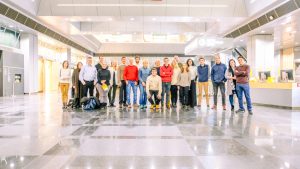eTAPAS: it will defines a conceptual Responsible Disruptive Technologies framework to assess and manage the ethical risks of DT-based applications in the public sector and their potential social and legal impacts.
WELIVE is a Horizon 2020 project that produced both a co-creation methodology and a set of supporting technological solutions to aid those stakeholders involved in the co-design and co-exploitation of services. Concretely, it developed an Ideation (Open Innovation) Board where stakeholders collaborate in the ideation, creation, funding and deployment of new services for the city and a Service Composer that enabled non-Information Communication Technologies (ICTs) users to assemble e-service apps from existing blocks. Partners involved: Fondazione Bruno Kessler, University of DEUSTO, Cloud’N Sci.
FAMILIES_SHARE is a Horizon 2020 project that explores bottom-up solutions to work-life balance involving citizens, NGOs, local stakeholders and public administration in the process of co-creation and co-delivery of childcare services. The project borrows and integrates concepts from the TimeBanks and Social Streets models, and investigates different approaches for collaborative childcare in 6 different European cities. Partners involved: Fondazione Bruno Kessler.
WILCO – Welfare Innovations at the Local Level in Favour of Cohesion project (a European Commission 7th Framework Programme for Research and Technical Development FP7) examined innovations in local services, the role of governments in facilitating or hindering such innovations, and the active involvement of citizens. Partners involved: Radboud University.
LIPSE – Learning in Public Sector Environments is a European Commission 7th Framework Programme for Research and Technical Development (FP7) that examined innovations in public administration, including co-creation and co-production. It identified drivers and barriers to successful social innovation in the public sector in 11 EU countries and 7 policy sectors, focusing on innovation environments, innovation tools and systems, and feedback loops. Partners involved: Radboud University.
STARDUST is an EU Horizon 2020 Smart Cities where Trento (Italy) is a lighthouse city. The project is developing a smart city platform that includes new retrofitting techniques and energy-efficient systems that rely heavily on Information Communication Technologies (ICTs). The platform is being installed in different buildings in Trento. Partners involved: Fondazione Bruno Kessler, DEDA Group.
EDI – European Data Incubator is an EU Horizon 2020 cascade funding project that promotes the creation of innovative data-driven solutions by European startups addressing the needs of European corporations that own huge amounts of highly valuable data but are not often able to extract the hidden potential insights key for their current business or to spot new opportunities. As a result of the ongoing execution of this project, around 50 sustainable Data Solutions over Big Datasets made available by 25 Data Provider Corporates in different key socio-economic sectors will be resulting. Partners involved: University of DEUSTO is the project coordinator.
MUSKETEER mission is to develop scalable algorithms for federated and privacy-preserving machine learning techniques, with detection and mitigation of adversarial attacks, complemented by a rewarding model capable to fairly monetize datasets according to the real data value. Partners involved: TREE Tec.
CITADEL aimed to explore, monitor and analyse the drivers, enablers, impact, risks and barriers of open, innovative and collaborative government across a diverse terrain of Public Administrations (PAs) through an open and scalable platform based on innovative Information Communication Technologies (ICTs) in order to understand, transform and improve by proposing recommendations to enhance the PAs policies and processes with a view to deliver effective, inclusive, high-quality public services across Europe Partners involved: the Ministry of Environmental Protection and Regional Development of the Republic of Latvia.
CITYKEYS goal is to define smart cities and their evaluation indicators, which ensures a close relationship and understanding of the future trends on Smart Cities to be developed under Horizon 2020 initiatives. Partners involved: the Municipality of Zaragoza.





